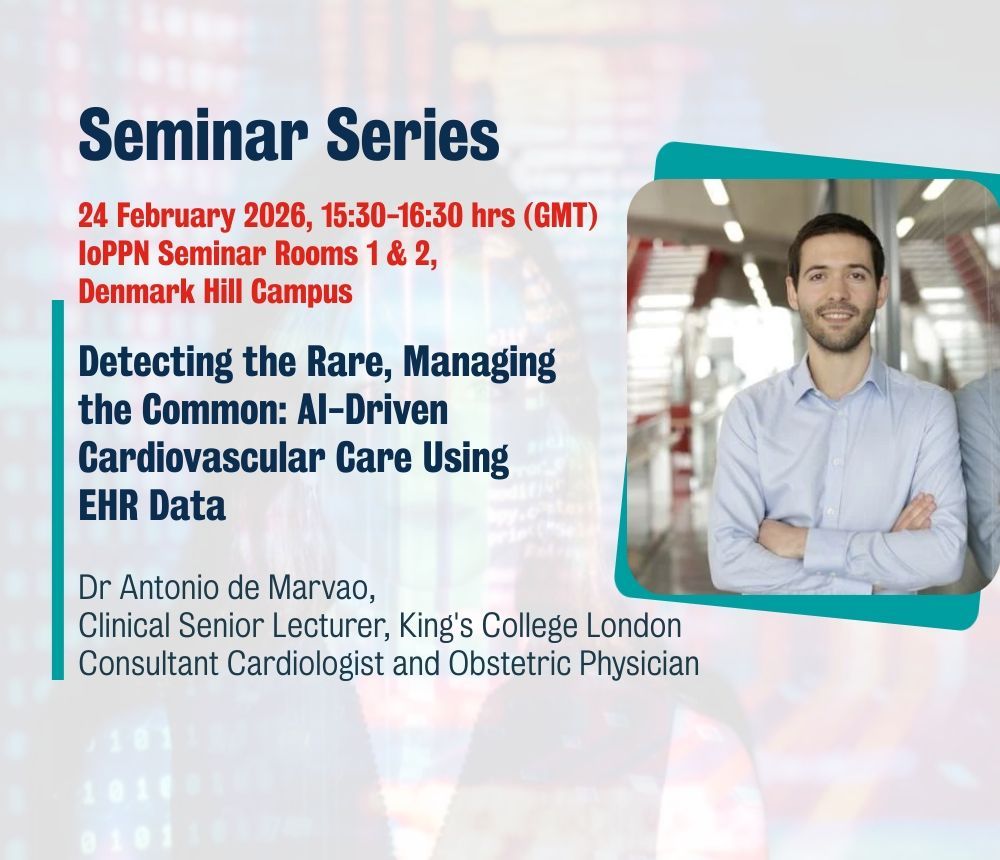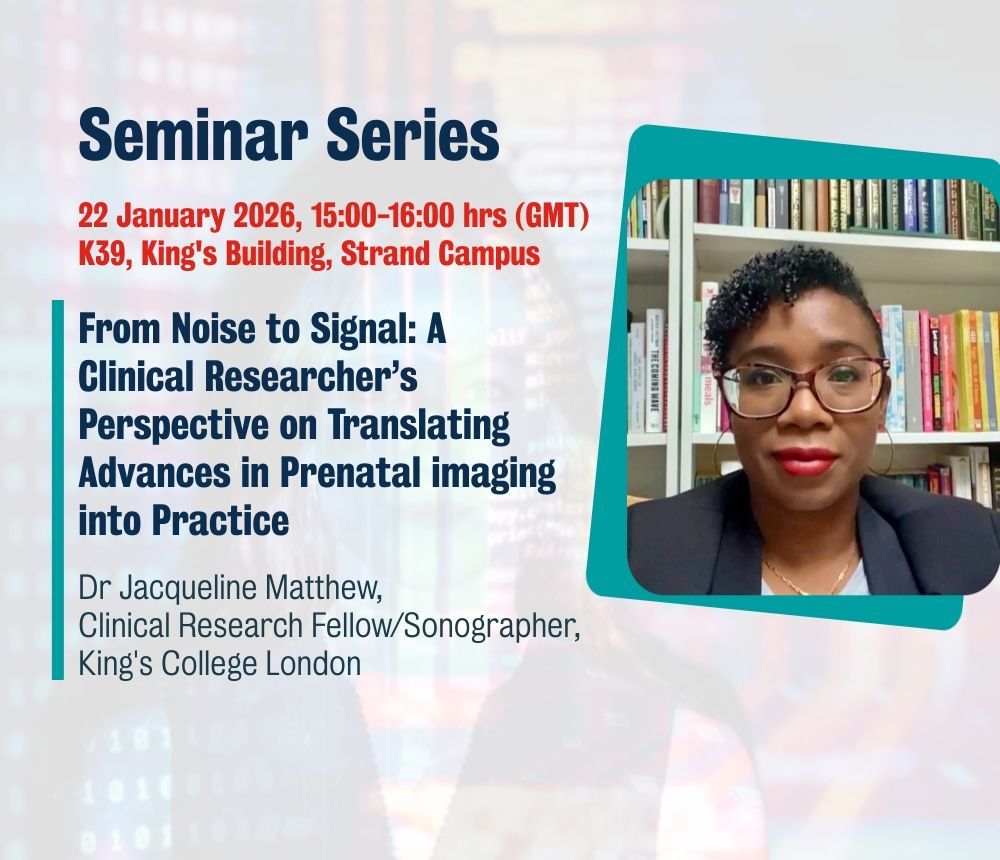Multi-million EPSRC funding for KCL DRIVE-Health CDT
March 13, 2024
DRIVE-Health has been awarded £7.9 million from The Engineering & Physical Sciences Research Council (EPSRC) for student intake from 2024 onwards. DRIVE-Health is one of 65 CDTs which received funding, totalling more than £1 billion.
Using seed funding from King’s Centre for Doctoral Studies awarded in 2020, DRIVE-Health has trained 30 students to date. Building on this, the new award will support five additional cohorts at King’s, totalling at least 85 talented PhD students. The CDT is expecting to welcome its fourth intake of at least 15 students in October 2024.
DRIVE-Health is the first health data science training centre in the UK to harness cross-sector collaboration across the NHS, industry, enterprise, policy makers, and academia. Working with diverse partners, DRIVE-Health PhD students develop cutting-edge models which leverage healthcare data to improve patient outcomes, streamline operations, and enhance clinical decision-making processes.
EPSRC CDT DRIVE-Health’s vision is informed by three core goals:
- To provide world-class training in health data science research to the next generation of health data scientists, who will have the multidisciplinary skills needed to enable transformations in public health and breakthrough treatments.
- To solve the most challenging problems in data-driven health research through a diverse community of the brightest minds in health data science and an open, collaborative culture which fosters exchange and champions innovation.
- To co-create a translational cross-sector collaboration with the NHS, industry, enterprise, policy makers and academia.
Professor Richard Dobson, Co-Director of DRIVE-Health and Professor of Medical Informatics at King’s IoPPN, says
"As more data from biological, social, genomic, imaging, smart devices, and electronic health records becomes available, there are significant opportunities to revolutionise the way healthcare is delivered. Through DRIVE-Health, we will train some of the brightest minds in health data science to develop cutting-edge tools which utilise data to improve healthcare systems and patient outcomes."
"This is an exciting time for medicine, with new data paradigms creating a novel research and implementation landscape covering the full span from cell to society. Over the next nine years, DRIVE-Health will nurture world-class researchers that will chart that landscape and drive the UK’s health data agenda." Professor Vasa Curcin, Co-Director of DRIVE-Health and Professor of Health Informatics at King’s FoLSM.
The DRIVE-Health PhD Programme (2024-2032) focuses on five key scientific research themes:
- Sustainable health data systems engineering: Investigates methods to develop secure and scalable software systems for healthcare. Theme lead: Dr Zina Ibrahim.
- Multimodal patient data streams: Integrates diverse patient data types for analysis, including wearables and electronic health records. Theme lead: Dr Jorge Cardoso.
- Complex simulations and digital twins: Builds simulated environments to train AI models for healthcare applications. Theme lead: Dr Steffen Zschaler.
- Next-generation clinical user interfaces: Ensures healthcare data science applications are usable in clinical settings. Theme lead: Professor Nick Holliman.
- Co-designing impactful patient-centric healthcare solutions: Co-producing and co-designing healthcare solutions to maximise impact across all themes. Theme lead: Professor Claire Steves.
On top of the £7.9m provided by the EPSRC, DRIVE-Health has received over £5.1m from partners, as well as in-kind contributions worth nearly £4m.
Share

We are pleased to welcome Dr Antonio de Marvao - Clinical Senior Lecturer at King's College London, and Consultant Cardiologist and Obstetric Physician at GSTT and KCH - who will deliver his talk “Detecting the Rare, Managing the Common: AI-Driven Cardiovascular Care Using EHR Data" as part of our Seminar Series. Abstract: Cardiovascular disease encompasses rare inherited conditions and highly prevalent disorders such as hypertension and cardiometabolic disease. Despite differing epidemiology, both require accurate, dynamic and scalable risk stratification. Electronic health records provide longitudinal, multimodal data at population scale. However, their heterogeneity and fragmentation demand advanced artificial intelligence methods to generate clinically actionable insight. Approximately 70 to 80 percent of NHS data exists in unstructured free text, rendering much of the clinically relevant signal inaccessible to conventional analytics without natural language processing or large language models. To address this challenge, we have been developing an AI-enabled framework for real-world cardiovascular risk prediction using integrated EHR data. The approach brings together structured clinical variables, imaging outputs and free-text documentation within secure hospital environments. Natural language processing and large language models are used to transform narrative records into computable features, while chain-of-thought reasoning architectures extract guideline-defined risk parameters directly from routine documentation. This enables automated calculation of established risk scores and dynamic longitudinal reassessment within an agentic workflow. Local, open-source models are evaluated across parameter scales to ensure an appropriate balance between accuracy, safety and computational efficiency for clinical deployment. In inherited cardiac conditions, this approach enables automated extraction of echocardiographic and clinical features required for sudden cardiac death risk prediction, reducing manual burden and supporting real-time monitoring. The same principles extend to hypertensive disorders of pregnancy, facilitating earlier detection, structured surveillance and stratification of long-term cardiovascular risk. Integration of high-resolution EHR-derived phenotypes with genomic and multi-omics datasets further supports progression from risk prediction to biological insight and therapeutic target discovery. Applied rigorously, AI methodologies operating on routine healthcare data provide a scalable foundation for precision cardiovascular care across the life course. Seminar Series Event : “Detecting the Rare, Managing the Common: AI-Driven Cardiovascular Care Using EHR Data" Date and Time: Tuesday 24 February 2026, 15:30 – 16.30 hrs (GMT) Location: IoPPN Seminar 1 & 2, Denmark Hill Campus Attendance: Mandatory for all DRIVE-Health students; a calendar invitation has already been sent. Registration: Alumni and wider King's College London research community all welcome - please email drive-health-cdt@kcl.ac.uk to let us know if you would like to attend. Biography Antonio de Marvao is a Clinical Senior Lecturer at KCL, and a Consultant Cardiologist and Obstetric Physician at GSTT and KCH, specialising in inherited cardiac conditions, maternal cardiology, and hypertensive disorders of pregnancy. His research sits at the intersection of electronic health records (EHR) derived phenotyping, genomics/multi-omics, and cardiovascular imaging, using machine learning to improve risk prediction modelling and personalise care, across the reproductive continuum - from pregnancy to postpartum - and long-term cardiovascular prevention. He leads work within the NHS England Genomic AI Network, applying natural language processing, large language models and multimodal EHR integration to identify patients with inherited cardiovascular disease, streamline specialist review, and improve access to genetic testing and family screening. In parallel, his group also uses AI and EHR data to better define and detect hypertensive disorders of pregnancy at scale, quantify disparities, and enable earlier, more targeted intervention.

We were pleased to welcome Dr Jacqueline Matthew - Clinical Research Fellow/Sonographer at King's College London - who delivered her talk “From Noise to Signal: A Clinical Researcher's Perspective on Translating Advances in Prenatal imaging into Practice" as part of our Seminar Series. Abstract: Over the past decade, machine learning approaches in prenatal imaging has advanced from exploratory academic prototypes to clinically usable, real-time tools, but the path between those two endpoints is rarely straightforward. In this talk, Jacqueline offered a clinical researcher’s perspective on translating biomedical engineering innovations into real-world impact, tracing the journey from the iFIND project’s early breakthroughs in automated fetal imaging to the creation of Fraiya, an AI-driven ultrasound platform now entering clinical deployment. She unpacked the technical, clinical, and regulatory hurdles that shape this trajectory: data acquisition at scale, annotation complexity, model robustness, pipeline optimisation for real-time use, clinical safety engineering, regulatory strategy, and integration with NHS digital ecosystems. Beyond the technical achievements, the session reflected honestly on the innovation “gaps” that researchers and engineers encounter when stepping into entrepreneurship. From productising research outputs, building 'with' clinicians and service users not just 'for' them, securing buy-in, navigating procurement, and proving value in operationally stretched healthcare services. The aim was to provide a pragmatic and motivating roadmap for researchers and innovators seeking to turn biomedical AI research into deployable, sustainable solutions in healthcare. Seminar Series Event : “From Noise to Signal: A Clinical Researcher's Perspective on Translating Advances in Prenatal imaging into Practice. Date and Time: Thursday 22 January 2026, 15:00 – 16.00 hrs (GMT) Location: K39, King's Building, Strand Campus Attendance: Mandatory for all DRIVE-Health students, therefore please accept the calendar invitation. Registration: Alumni and wider King's College London research community all welcome - please email drive-health-cdt@kcl.ac.uk to let us know if you would like to attend. Biography Jacqueline is a clinical academic, sonographer, and MedTech entrepreneur with over 20 years of experience in advancing pregnancy care through compassionate, technology-driven solutions. Specialising in ultrasound and fetal MRI, Jacqueline’s work focuses on leveraging cutting-edge imaging technologies to improve screening, diagnosis, and care for pregnant women. With a PhD in advanced 3D ultrasound and fetal MRI, Jacqueline uses machine learning to refine diagnostic pathways, pushing the boundaries of what’s possible in prenatal care. As Clinical Lead and Chief Medical Officer at an early-stage health tech startup, she has been at the forefront of developing a real-time AI-powered pregnancy ultrasound platform, with ambitions to transform how scans are performed, enhancing diagnostic accuracy, and empowering healthcare professionals to deliver more informed and compassionate care. Jacqueline’s work has earned her widespread recognition, including being named one of the inaugural winners of the NHS England CAHPO Gold Award for Excellence, which celebrates health professionals who exemplify exceptional contributions to healthcare and the NHS values.




